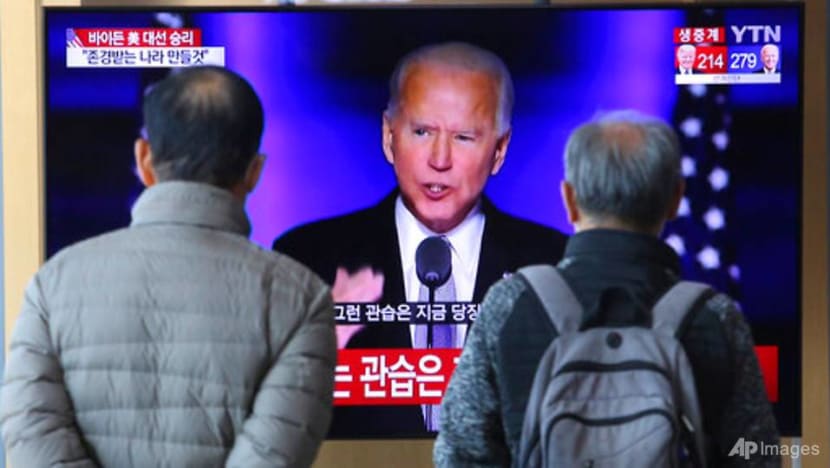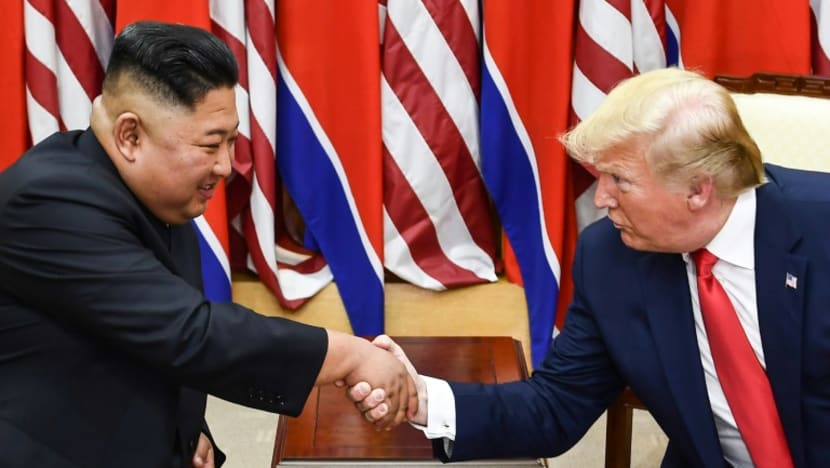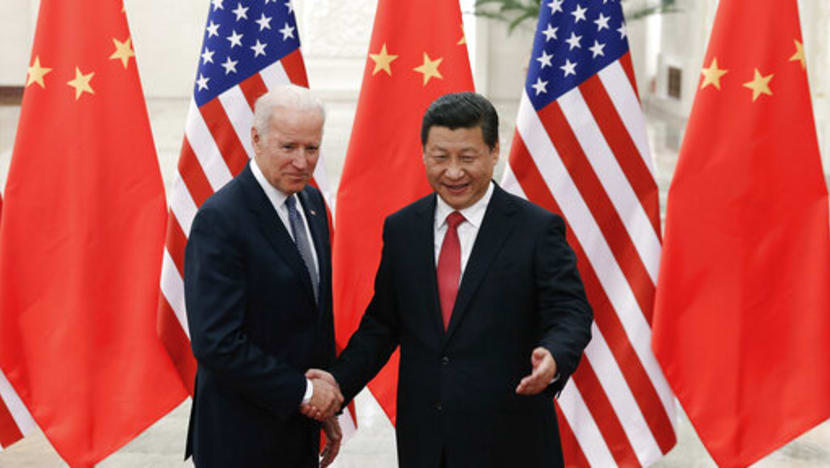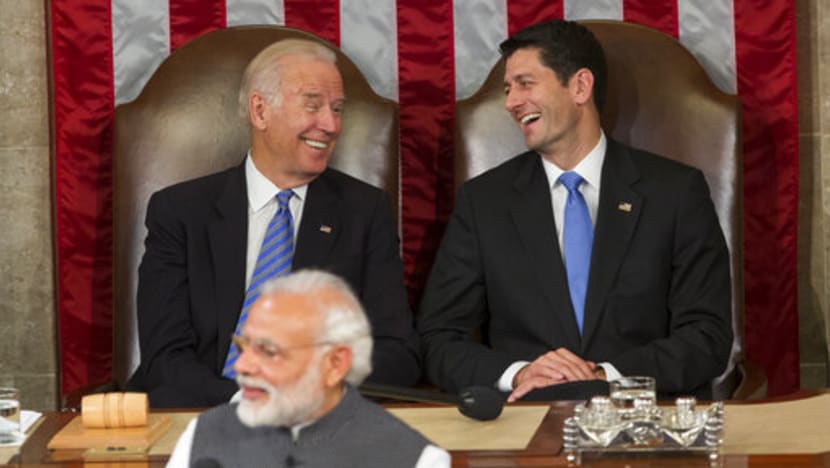A worried Asia wonders: What will Joe Biden do as US president?

People watch a TV screen showing the broadcast of President-elect Joe Biden speaking, at the Seoul Railway Station in Seoul, South Korea, Sunday, Nov. 8, 2020. (AP Photo/Ahn Young-joon)
TOKYO: As Asia comes to terms with the reality of a Joe Biden administration, relief and hopes of economic and environmental revival jostle with needling anxiety and fears of inattention.
From security to trade to climate change, a powerful US reach extends to nearly every corner of the Asia-Pacific. In his four years in office, President Donald Trump shook the foundations of US relations here as he courted traditional rivals and attacked allies with both frequency and relish.
Now, as Biden looks to settle tumultuous domestic issues, there’s widespread worry that Asia will end up as an afterthought. Allies will go untended. Rivals - and especially China, that immense US competitor for regional supremacy - will do as they like.
Commentary: Asia’s future hangs on who wins US election
In the wake of perhaps the most contentious presidency in recent US history, here's a look at how its aftermath - a Biden White House - will play out in one of the world’s most important and volatile regions:
SOUTHEAST ASIA
Some countries in the region, such as Malaysia, have pivoted toward China because of heavy investment and a focus on economic recovery, and “it will take time for the US to rebuild trust”, said Bridget Welsh, honorary research associate at the University of Nottingham in Malaysia. "US power will never be what it was."
Biden is also likely to be more wary in his dealings with strongman leaders like the Philippines’ Rodrigo Duterte, Thailand's Prayut Chan-o-cha and Cambodia's Hun Sen, said Richard Heydarian, an analyst in the Philippines.
“A more cautious Biden could also mean a degree of stability in relations with tricky allies and partners in Southeast Asia and the region,” he said. “We are going to see American leadership, but much more in conjunction with regional players and powers, including Japan, Australia, India, European powers” and Southeast Asia.
Singapore Prime Minister Lee Hsien Loong in his congratulatory letter to Biden on Sunday said "many countries" are looking forward to the US' leadership in overcoming significant global challenges, "especially the immediate crisis brought by the COVID-19 pandemic".
READ: Kamala Harris' election victory a 'historic moment for women minorities in the US': Halimah Yacob
THE KOREAS
Say goodbye to the summits.
Trump and North Korean leader Kim Jong Un went from threats of war to three unprecedented sit-downs, which, though high-profile media events, did nothing to rid the North of its banned nuclear-tipped long-range missiles.

Kim must now adjust to a man his propaganda services once condemned as a “rabid dog” that “must be beaten to death”.
Biden, for his part, has called Kim a “butcher” and “thug”, and said Trump had gifted a dictator with legitimacy with “three made-for-TV summits” that produced no disarmament progress.
Biden has endorsed a slower approach built from working-level meetings and said he would be willing to tighten sanctions on the North until it takes concrete denuclearization steps.
North Korea, which has yet to show any willingness to fully deal away a nuclear arsenal that Kim may see as his strongest guarantee of survival, prefers a summit-driven process that gives it a better chance of pocketing instant concessions that would otherwise be rejected by lower-level diplomats.
For South Korea, the new president will likely demonstrate more respect toward its treaty ally than Trump, who unilaterally downsized joint military training and constantly complained about the cost of the 28,500 US troops stationed in the South to defend against North Korea.
READ: From 'love' to 'thug' - Biden win to change US-North Korea dynamic
President Moon Jae-in congratulated Biden on Monday and said South Korea will ensure there is no gap in the alliance with the US and the process of building peace on the Korean peninsula.
Foreign Minister Kang Kyung-wha was in Washington for talks with her American counterpart on a visit now overshadowed by Biden’s projected victory.
"From the public remarks made by several of Biden's aides, I don't believe it intends to return to the strategic patience of the past," Kang said, according to Yonhap news agency.
"It should be made based on various progress and achievements made the past three years."
Yonhap said Kang would meet Biden’s foreign affairs and security members and discuss cooperation, without elaborating.
CHINA
The two nations are inexorably entwined, economically and politically, even as the US military presence in the Pacific chafes against China’s expanded effort to have its way in what it sees as its natural sphere of influence.
Under Trump, the two rivals engaged in a trade war, and a lively exchange of verbal hostilities. A Biden administration could have a calming effect on those frayed ties, according to Alexander Huang, a strategic studies professor at Tamkang University in Taipei and a former Taiwanese national security official.
“I’d expect Biden to return to the more moderate, less confrontational approach of the Obama era toward China-US relations,” he said.
READ: Biden win opens door for improved predictability in China-US relations - Chinese state media

Retired chemical engineer Tang Ruiguo echoed a view shared by many in China of an unstoppable US decline from global superpower status. “No matter who is elected, I feel the United States may go into turmoil and unrest and its development will be affected,” Tang said.
READ: 'Don't worry' - Pro-Trump Taiwan seeks to reassure over Biden
JAPAN
The resignation this year of Japanese Prime Minister Shinzo Abe ended one of Trump’s few close, productive relationships with a foreign leader.
There’s hope in Tokyo that Biden’s more progressive ecological policies will help Japanese green companies and that he will take a hard line on China, with which Japan is in constant competition.
But there’s also worry.
Under Biden, “America cannot afford to take care of other countries, and it has to prioritise its own reconstruction,” said Hiro Aida, Kansai University professor of modern US politics and history.
As Biden is consumed with his nation’s many domestic troubles, from racial unrest to worries about the economy, healthcare and the coronavirus, Japan could be left alone as China pursues its territorial ambitions and North Korea expands its nuclear efforts, according to Peter Tasker, a Tokyo-based analyst with Arcus Research.
Commentary: The world has big expectations for a Joe Biden presidency
READ: 'Welcome back America!' World leaders congratulate Biden and Harris on win
INDIA
Not much will change with the host of security and defence ties shared by India and the United States. But a Biden administration could mean a much closer look at India’s spotty recent human rights and religious freedom records, both of which were largely ignored by Trump.
Biden is also expected to be more critical of Prime Minister Narendra Modi’s Hindu-nationalistic policies, which critics say oppress India’s minorities, according to Michael Kugelman, deputy director of the Asia Program at the Washington-based Wilson Center.

The countries will work more closely to counterbalance China, a shared rival, Kugelman said. A Biden White House won’t “risk antagonizing a country that is widely viewed in Washington as America’s best strategic bet in South Asia,” he said.
AUSTRALIA AND NEW ZEALAND
The conservative Australian prime minister who was in power when Trump was elected, Malcolm Turnbull, may have spoken for many when he tweeted congratulations to Biden: “What a relief that you won.”
There’s hope that Biden will do better than the Trump administration, which granted Australian manufacturers exemptions from US steel and aluminum tariffs in 2018 before reportedly having a change of heart a year later.
READ: Australia says US return to Paris Agreement, WHO under Biden would be welcome
For New Zealand, there are aspirations to sell more milk and beef under a US administration that’s more open to free trade.
New Zealand and other Pacific nations also hope that Biden might help ease tensions with China.
New Zealand has found itself stuck between the two superpowers, relying on China as its biggest trading partner while maintaining traditional defense and intelligence ties with the United States.










